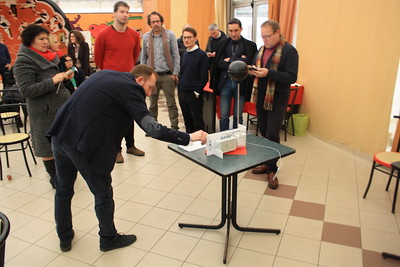Co-learning
Also known as: Co-learning session, transferability session, replication workshop
Co-learning workshops approach new knowledge through collective questioning and reflection.
Attendees first hear about the experience of an expert, or a peer that has piloted an innovative approach with promising results. Then, through open discussion, all present capitalise on each other’s collective reflection and comparison to their own practices. This method of knowledge exchange embraces collective training and helps identify the transferability potential of a given solution other contexts.
Method
- Case study presentation: The workshop begins with a presentation that provides an in-depth look at the chosen topic.
- Structured discussion: Following the presentation, participants engage in discussion. The conversations revolve around the lessons learned, how they might be applicable in different urban scenarios, and any potential challenges or barriers foreseen in implementation.
- Group dynamics: Often, to facilitate more granular discussions, participants might be divided into smaller groups. This allows for more intimate and detailed conversations.
- Consolidation of lessons: After discussions, all groups converge to share their conclusions. The primary focus during this consolidation phase is understanding how the presented practices might be applicable or adapted to participants’ own contexts.
Examples of application
Eurocities’ EU-funded Fast Track project:
-
- Initiation: The workshop began with the main case study presentation.
- Facilitated discussions: After this, facilitators posed questions inspired by the presentation, steering the discussion. Participants then split into smaller groups for deeper dives into these questions.
- Group convergence: After discussions, groups reconvened to share their discussions’ outcomes. Emphasis was laid on understanding the transferability of the practices to their cities.
Eurocities’ EU-funded USER-CHI Project:
-
- Duration: Workshops in the USER-CHI project had a standard duration of approximately two hours.
The co-learning workshop methodology provides a structured approach to understanding and dissecting innovative practices, ensuring participants walk away with actionable insights tailored to their unique contexts.
Top tips
- Set goals: Identify and communicate the learning objectives of the session clearly to maintain focus and drive meaningful discussions.
- Foster inclusion: Encourage open dialogue, value every opinion, and ensure every participant feels heard to cultivate richer, more diverse insights.
- Engage actively: Encourage participants to be proactive in discussions, share their experiences, and ask questions to deepen understanding and facilitate learning.
- Facilitate effectively: Guide discussions constructively, keep the conversation on track, and ensure a balanced participation to maximise the learning outcomes.
- Evaluate transferability: Encourage participants to assess how the discussed practices and lessons can be adapted and applied in their own contexts.
Pros & cons
Pro
- Relevant when clear solutions are presented for transferability.
- Perfect to gather specialists exchanging knowledge and challenges on a precise topic – online or onsite, to provide and receive constructive feedback on specific issues, share best and inspiring practices, and collectively think of solutions and innovations to address common challenges.
Cons
- Requires a very structured discussion and several moderators
Outcomes and impact
Co-learning should result in a deeper understanding of a best practice, and new ideas about how it could be implemented or further developed. This may take the form of a document like an action plan, outlining how such a practice may be manifested in another participant’s city.
Impact
In the Culture for Cities and Regions project, Leeds visited Espoo, and Espoo Leeds, for study visits on culture and education and partnerships between schools, libraries and cultural institutions.
After the visits, the two cities started a close collaboration: Leeds won an ERASMUS+ project (PACE) involving Espoo as one of the project partners; and with the help of Espoo, Leeds adapted the ‘Finnish place-based curriculum’ which allows cities to adapt the school curriculum to local needs and context. There is an ongoing exchange of best practice at different levels and strong links have been developed between the library services in both cities.
Pitfalls
The innovation/solution should be presented in a very structured way (see UpSocial slides/material). That is crucial to activate the right questions. It works best when only one solution is presented at a time.
Links
Read more about co-learning methodologies on page 19 of this document from our FastTrack project.


